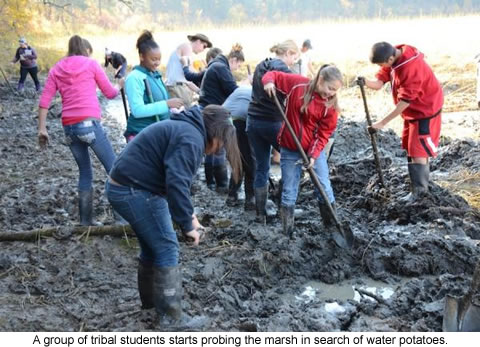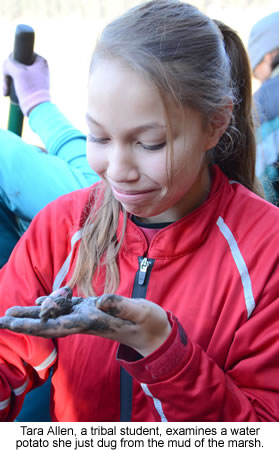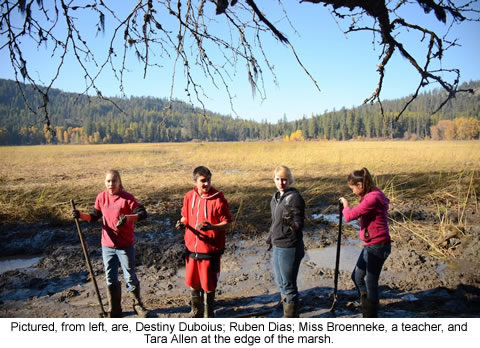 |
Canku Ota
|
 |
|
(Many Paths)
|
||
|
An Online Newsletter
Celebrating Native America
|
||
|
December
2013 - Volume 11 Number 12
|
||
|
|
||
|
Students Get Muddy
Digging Water Potatoes in Idaho
|
||
|
by Jack McNeel - Indian
Country Toady Media Network
|
||
|
credits: all photos by
Jack McNeel
|
|
Nine schools and roughly 325 students took part over three days in October in Plummer, Idaho. Water potatoes, sqigwts in the Coeur d'Alene language, have been dug and eaten for many generations here and by other tribes of the region. The name varies from tribe to tribe, sqa qwo sn with the Kalispel, wapato with the Yakama, but with each it provides a late season food item that was used throughout the winter. Tribal elder Felix Aripa welcomed the students and talked about the historical significance of water potatoes. He is now in his 80s and recalled digging water potatoes with his family when he was a child. "This was our last harvest. They came here to gather water potatoes in abundance. They came together with relatives and friends." Aripa brought a laugh as he said, "I'm glad the tribe decided to have a water potato day instead of that Christopher Columbus guy." He spoke briefly of early tribal life and how water potatoes, berries, fish and animals provided their sustenance. "This is a Native way," he said.
Water potatoes are quite small, about the size of the end of an adult thumb. Students were given bags to hold their harvest, which they could either take home or donate for use in other events. They can be eaten fresh, but are more commonly roasted or boiled. They were the last root to be gathered in the fall and were dried for use throughout the winter. Vincent Peone was manning another station. He had a fire going to smoke elk meat and taught students about traditional foods. "Dried meat is just one of our traditional foods," he explained, and talked of other foods like salmon and huckleberries. "Bitterroot was bitter but it was life sustaining so you would dry those roots." Peone also talked of how small family groups had their own areas spend winter, "about the size of this area," he said of the four teepees used during the event near the lakeshore. "In the days of the early ancestors teaching was highly valued by the younger generation. In the winter a lot of time was spent inside teepees; lots of storytelling and teaching." In another teepee students were examining beaver pelts and learning how the tribe is using the beavers now by relocating them to streams where they construct dams, which allows sediment to settle and improves water quality for people and other wildlife. At another site Raymond Brinkman, who heads up the tribal language program, talked not only about the language but why certain areas were selected as wintering sites. Factors like availability of food and the more moderate temperatures created by the lake helped determined sites.
But it was the shoreline where students gathered to dig water potatoes that attracted the greatest attention. The excitement level was high and frequently pierced with an excited "I found one!" from the students. |
|
|
||
|
|
||
| Canku Ota is a free Newsletter celebrating Native America, its traditions and accomplishments . We do not provide subscriber or visitor names to anyone. Some articles presented in Canku Ota may contain copyright material. We have received appropriate permissions for republishing any articles. Material appearing here is distributed without profit or monetary gain to those who have expressed an interest. This is in accordance with Title 17 U.S.C. Section 107. | ||
|
Canku Ota is a copyright ©
2000 - 2013 of Vicki Williams Barry and Paul Barry.
|
||
 |
 |
|
|
The "Canku
Ota - A Newsletter Celebrating Native America" web site and
its design is the
|
||
|
Copyright ©
1999 - 2013 of Paul C. Barry.
|
||
|
All Rights Reserved.
|
||
 Mud
and kids go hand in hand, so when the opportunity presents itself
for youngsters to wade into a muddy marsh in the name of education,
much laughter ensues. Such was the situation on the Coeur d'Alene
Reservation when students from surrounding schools, both Native
and non-Native, held an annual "Water Potato Day" in muddy marshes
that have historically provided food for tribal families gathered
here to spend the winter months.
Mud
and kids go hand in hand, so when the opportunity presents itself
for youngsters to wade into a muddy marsh in the name of education,
much laughter ensues. Such was the situation on the Coeur d'Alene
Reservation when students from surrounding schools, both Native
and non-Native, held an annual "Water Potato Day" in muddy marshes
that have historically provided food for tribal families gathered
here to spend the winter months. Students
were divided into groups and rotated between six stations where
various things were discussed: the value of beavers, native foods,
language, traditional tools, invasive species and local flora and
fauna. Boots were provided and students were instructed to not stand
in one spot too long because the muddy shoreline is not only soft
but can grab a boot and hold on until someone arrives to help. Shovels
were used rather than the traditional digging sticks, but the end
result was the same.
Students
were divided into groups and rotated between six stations where
various things were discussed: the value of beavers, native foods,
language, traditional tools, invasive species and local flora and
fauna. Boots were provided and students were instructed to not stand
in one spot too long because the muddy shoreline is not only soft
but can grab a boot and hold on until someone arrives to help. Shovels
were used rather than the traditional digging sticks, but the end
result was the same.